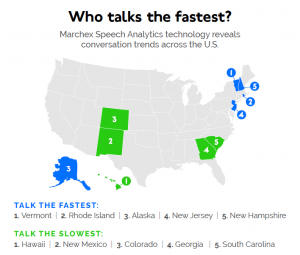Marchex Provides AI-Powered Speech Analytics Technology Not Only Automates Tasks like Call Transcription But Allows Businesses to Do a More Complex Sentiment Analysis of Inbound Phone Calls
Marchex, a leading provider of call analytics that drives, measures, and converts the callers into customers, has released findings from a new speech pattern study based on more than 6.8 million calls placed by consumers to businesses across the United States. Marchex Institute insights reveal how conversation patterns vary and empower businesses to optimize valuable phone interactions with customers.
Recommended Read: Contextual Content and AI: The New Wingmen for Email Marketing Campaigns

The dataset was analyzed using Marchex Speech Analytics technology, which leverages artificial intelligence, including machine learning and natural language processing algorithms, to analyze calls to businesses in a variety of industries. Key findings include —
- People from Wyoming topped the list for most talkative. Closely following are Montana, North Dakota, Vermont, and Maine. In fact, Wyoming residents talk 38 percent more than New Yorkers, who are the least talkative.
- The fastest talkers and most courteous callers hail from the North. People from northern states including Vermont, Rhode Island, Alaska, New Jersey and New Hampshire speak the fastest, based on words per minute. On average, the fastest talkers are from Vermont, who uttered 148 words per minute, while Hawaiians uttered an average of 134 words per minute, making it the slowest talking state. Closely following as the slowest talkers are New Mexico, Colorado, Georgia and South Carolina. Additionally, more people regularly use “please” and “thank you” on calls from Wyoming, Vermont, Maine, Montana, and Michigan.
- Patience is lower in the Pacific Northwest. In analyzing hold-time abandon rates, Washington state and Oregon demonstrated the least patience, along with Arkansas, Kansas, and Mississippi. By contrast, residents from states in the Midwest and Northeast demonstrated the highest patience, including Vermont, Delaware, Michigan, Minnesota and New Hampshire.
- Cursing increases as the day progress. On average, callers cursed 1.1 to 1.3 times per call across the board. However, cursing becomes more common as the day progresses. Profanity is least likely to be used before 4:00 p.m., but then the curse rate on calls doubles after 6:00 p.m., jumping from three percent to six percent. The data also shows that instances of cursing are nuanced.
Recommended Read: Now, Keep Your Best Customers Happy with the Oracle Loyalty Cloud
At the time of this announcement, Erin Murphy, analytics manager at theMarchex Institute, said, “Our AI-powered speech analytics technology not only automates tasks like call transcription but allows businesses to do a more complex sentiment analysis of inbound phone calls. This offers more contextual clues around customer reactions, tone, and phrasing, which are crucial in human-to-human conversation.”
Erin added, “For businesses, these insights can help solve critical customer service issues by providing visibility to call center operations in real-time, which in turn helps improve the customer experience.”
Building off these insights, Marchex has practical tips for organizations and their customer service agents to help improve the overall outcome of calls —
- Convey authenticity and positivity. Using phrases such as “I can solve that for you” or “I’d be happy to help” tends to reassure customers that you have their best interest at heart. In fact, a recent MarchexInstitute study2 found top performing customer service agents in the telecommunications industry said “happy” four times as often as other agents.
- Avoid negative phrases. Marchex data from the same study shows agents with lower sales rates said “no” twice as often as the top performing agents. Avoiding common negative phrases such as “No, I don’t think I can” or “No, that’s not right” can help.
- Use apologies sparingly. Agents with lower sales performance had apologized for 50 percent more than other agents and said “sorry” nearly four times as often. Participating as an active listener and communicating statements such as “I hear you” and “I understand” can be more effective in reaching a path to resolution.
Introduced in April 2017, Marchex Speech Analytics has so far analyzed approximately 100 million calls, more than 400 million minutes, and approaching four billion utterances.
Currently, Marchex helps companies identify customers that convert faster, buy more, and churn less. Marchex provides solutions that help companies drive more calls, understand what happens on those calls, and convert more of those callers into customers. Their actionable intelligence strengthens the connection between companies and their customers, bridging the physical and digital world, to help brands maximize their marketing investments and operating efficiencies to acquire the best customers.
Recommended Read: B2B Buying Disconnect: Are You Targeting the Right Set of Customers?











